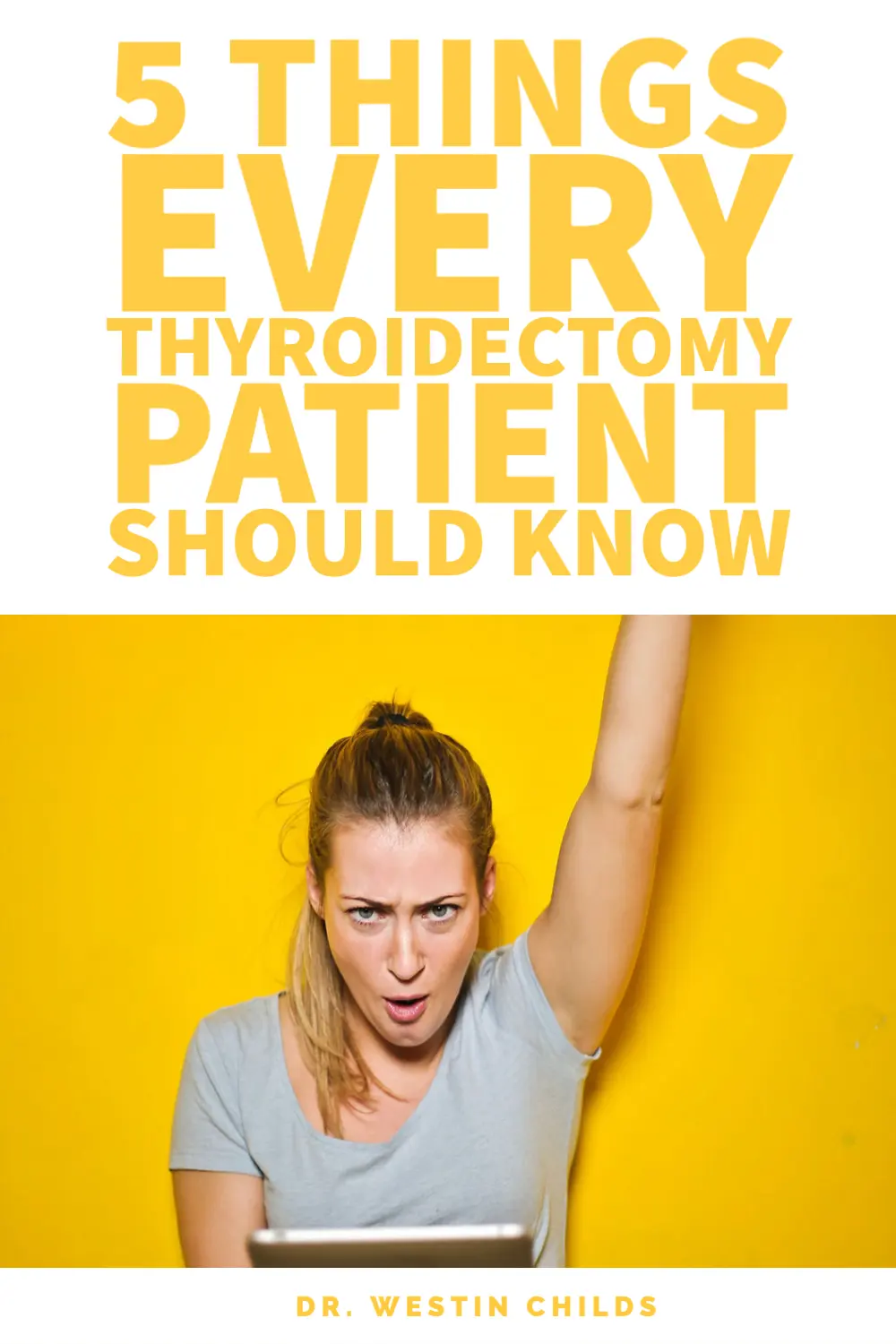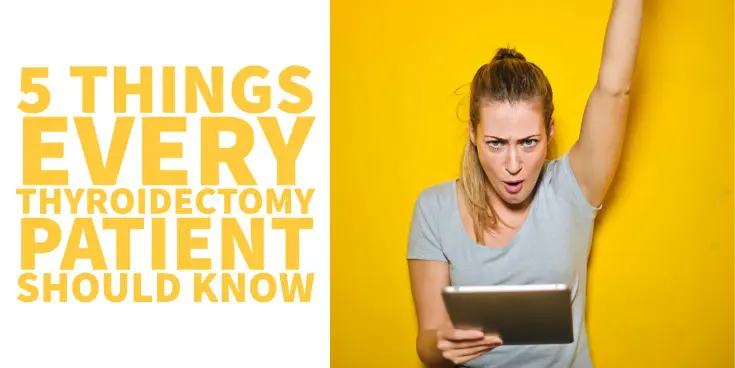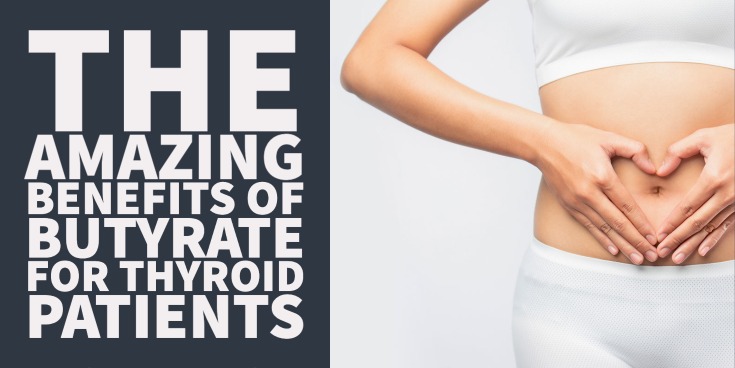Have you recently had your thyroid removed?
Are you suffering from symptoms AFTER having had your thyroid removed?
Maybe you are gaining weight or losing your hair?
If so, then this is the article for you!
In this article, we will take a deep dive into 5 things that I think every patient who has had their thyroid removed should know.
We will touch on topics including what you should be expecting once your thyroid has been removed, why it’s so difficult for patients to lose weight without a thyroid, how to naturally improve your thyroid function even after it has been removed, and more!
If you aren’t sure what to do after thyroid removal then you are in the right place.
DOWNLOAD FREE RESOURCES
Foods to Avoid if you Have Thyroid Problems:
I’ve found that these 10 foods cause the most problems for thyroid patients. Learn which foods you should avoid if you have thyroid disease of any type.
The Complete List of Thyroid Lab tests:
The list includes optimal ranges, normal ranges, and the complete list of tests you need to diagnose and manage thyroid disease correctly!
5 Things you should know if you have a thyroidectomy
I’ve treated hundreds (probably more than a thousand) of thyroid patients in my clinical practice and I’ve run into many patients without a thyroid.
These patients are certainly more difficult to treat than run-of-the-mill thyroid patients but I’ve learned much in my years of treating them.
While they are more difficult, it’s still possible to help them lose weight and feel better.
It just takes the right approach…
With that in mind, here are 5 things that I think you should know if you’ve had your thyroid removed based on THIS experience.
#1. You are now HYPOTHYROID.
This is probably the single most important thing that you understand if your thyroid has been removed.
Once your thyroid is removed you are now considered to be HYPOTHYROID.
It doesn’t matter WHY your thyroid was removed, once it is removed you now have a sluggish thyroid.
I don’t care if your thyroid was removed because you WERE hyperthyroid (the opposite of hypothyroidism).
Thyroid removal is considered to be a cure for hyperthyroidism but once your thyroid is out you’ve effectively traded hyperthyroidism for hypothyroidism.
What does it mean to be hypothyroid?
It means that you are reliant upon thyroid medication.
And because doctors do a terrible job at replacing lost thyroid hormone once the thyroid has been removed, you will probably always feel a little bit hypothyroid (there are ways to get around this of course, but it requires a different approach than what your endocrinologist is willing to do).
This is so important because many people will read my blog posts and if they’ve had their thyroid removed they will ask if it applies to them.
If your thyroid has been removed then 99% of the information I put out IS relevant to you (In fact, you can see it all here)!
It is true that it will always be tougher for you than for someone who has something like Hashimoto’s but you both are technically in the same position in that your thyroid does not function very well.
This ALSO applies to people who have had their thyroid ablated with radioactive iodine, by the way!
Never forget that once your thyroid has been removed you are NOW hypothyroid.
#2. T4 isn’t enough by itself for you.
Another important point, which will fly in the face of the information that your endocrinologist gives you, is that T4 thyroid medication is NOT enough for patients without a thyroid.
Let me back up so this sinks in.
Once your thyroid is removed you are placed on thyroid medication.
The medication that your doctor will use will either be Synthroid or levothyroxine.
Both of these medications contain the same active ingredient which is known as T4 or thyroxine.
But what you probably don’t know is that T4 is NOT active in your body.
In order to be activated, it must be converted to another thyroid hormone known as T3.
And we know from certain medical studies that patients without a thyroid, who take T4 medications like Synthroid and levothyroxine, NEVER achieve a normal level using these medications!
This has been proven in studies (1) that compare patients without a thyroid (people like you) to people WITH a thyroid gland.
They found that these medications are NOT enough to normalize free thyroid hormone levels.
Which probably accounts for the hypothyroid symptoms (such as weight gain) that patients experience once their thyroid has been removed.
What’s the solution?
The solution is to use COMBINATION thyroid medications which contain the active thyroid hormone T3 in addition to the inactive thyroid hormone T4.
You can do this by taking two separate medications or by taking one which contains both (such as Armour thyroid).
Either way, you will probably feel much better once you get them both in your system.
#3. You will probably gain weight and weight loss will be difficult.
This is a sad fact that many patients will experience if they have their thyroid removed.
We know from medical studies (2) (and just from patient experience) that about 80% of patients will GAIN weight once their thyroid is removed.
The average amount of weight gained post thyroidectomy is somewhere around 15 to 20 pounds.
It gets worse when you realize that some people gain MORE weight, especially those who were already a little overweight before their operation/surgery.
Okay, you get it, but why does this occur?
It occurs because most patients, once they have their thyroid removed, don’t get adequate treatment (see number 2 above).

As frustrating as it is for patients who fit into this category, this is just the current situation.
Does it mean that you will be overweight forever?
Not at all! In fact, there are definitely ways to lose weight once your thyroid has been removed.
If you are interested in losing weight be sure to check out my tips and tricks designed to help thyroidectomy patients lose weight.
Part of this includes getting on the right type and dose of thyroid medication.
But you should be aware that it will ALWAYS be more difficult for YOU to lose weight (if you don’t have a thyroid) compared to people who have a thyroid even if it is sluggish.
It’s not impossible, though, so don’t let that get you down.
But it does mean you will need to be more aggressive and potentially use medications in addition to vitamins, supplements, diet, exercise, and so on.
#4. Thyroid supplements can and SHOULD be used.
This is another HUGE point of confusion among patients without a thyroid.
They often think:
“Well, if I don’t have a thyroid then I don’t have to take thyroid supplements”.
And you couldn’t be more wrong.
Remember, I just told you that doctors often prescribe only ONE medication (levothyroxine) and that THAT medication is not even active.
Guess what activates it?
Certain nutrients in your body such as zinc and selenium (as well as many others).
So even if you DON’T have a thyroid you can STILL benefit from using thyroid support supplements!
It doesn’t matter that your thyroid has been removed because you are STILL receiving thyroid hormone (otherwise you would be dead).
The difference is HOW you are getting that thyroid hormone.
People without a thyroid get it from their medication.
People with a sluggish thyroid get it from both their medication AND their thyroid gland.
This also applies to IODINE as well.
Most doctors will tell you that you don’t need iodine if your thyroid has been removed.
Can you guess if that recommendation actually makes sense?
The answer is a big nope.
While it is true that MOST of the iodine is stored in your thyroid gland there are still plenty of other tissues that REQUIRE iodine for proper function.
Skin tissue and breast tissue immediately come to mind.
And because humans can’t create iodine they MUST consume it (either through iodine supplements or from food).
So don’t fall for that one either.
It may sound crazy that your doctor doesn’t know this stuff but trust me when I say that they don’t.
If you don’t believe me you can always ask them as well!
#5. You will be on medication FOR LIFE.
Lastly, and this one shouldn’t come as a big surprise for most of you, if you’ve had your thyroid removed then you will be on thyroid medication for the rest of your life.
Thyroid hormone is required for life.
If you don’t have enough then you will go into a coma and die.
So that means once your thyroid has been removed you must take medication forever to keep your levels up.
Most people without a thyroid are aware of this but some people were never told or didn’t realize this.
It’s important because in some of my other articles and videos, I talk about how it might be possible to get off of medication for certain people.
This information does NOT apply to you if you don’t have a thyroid because you have no other source of thyroid hormone production in your body.
Final Thoughts
I’ve listed what I believe to be the most important things that you should do if you have your thyroid removed!
Preferably, you should be aware of these things BEFORE you get your thyroid removed but I know most people won’t see this until after their thyroid has been removed.
I want you to know that as a thyroid patient just because your thyroid has been removed doesn’t mean you need to stay feeling poorly for the rest of your life.
It is possible to not only feel better but get pretty close back to your normal self with or without a thyroid.
It will take some work on your part, and manipulation of your medication, but it is possible!
And if you’re going to take the effort to get your thyroid back to normal, I would highly recommend using a combination of both supplements and thyroid hormones.
You don’t have control over which thyroid medication your doctor gives you, but you can absolutely control which supplements you take.
If you want to support your thyroid (which you should), check out these supplements.
And if you want to make weight loss easier (which you should), check out these.
Scientific References
#1. https://www.ncbi.nlm.nih.gov/pmc/articles/PMC3148220/
#2. https://www.ncbi.nlm.nih.gov/pmc/articles/PMC3229816/








